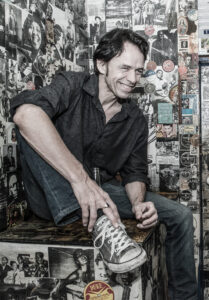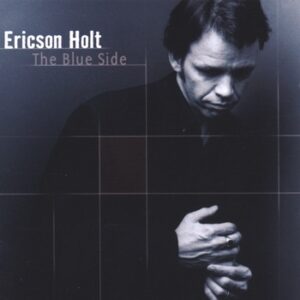About Ericson Holt
 Though his music may be steeped in the blues, it’s the gray areas that fascinate Ericson Holt the most.
Though his music may be steeped in the blues, it’s the gray areas that fascinate Ericson Holt the most.
“There are very few moments in this life that are purely good or bad,” Holt reflects. “There’s always some kind of dichotomy going on, some kind of complication, and that’s what interests me as a writer.”
With his captivating new album, “99 Degrees”, Holt shines a light on those complications, exploring the almosts and the in-betweens, the missed chances and the could-have-beens, the close calls and the never-quites. The characters here contain multitudes, walking a fine line between hope and desperation as they navigate a world that seems perpetually stacked against them. The music is similarly rich and nuanced, drawing on everything from 70’s AM rock and soulful folk to raucous boogie woogie and second line funk. Holt cut the majority of the album in just two days with an all-star band of Nashville heavyweights (many of whom he knew from his own work as a first-call session player and sideman), and the result is a collection of raw, spontaneous, organic performances that breathe life into his stories of everyday folks living on the margins — ordinary men and women struggling to get by, stay in love, and find a little bit of light in the darkness.
“Sometimes I write deliberately, and sometimes the songs write themselves,” Holt says. “But ultimately, there’s a part of me and my story in every one of these characters.”
Holt’s story begins in Virginia, where he inherited a passion for literature and a wide ranging musical appetite from his mother, heralded western novelist, A.H. Holt. He picked up the piano first, studying classically until rock and roll took over his life. He later added guitar to his repertoire with a little help from his cousin, Dean Musser, a gifted Travis picking style player who taught him the Nashville number system of writing out chord charts. Holt spent much of his teens and twenties playing in other people’s bands, as well as his own, while developing his voice as a writer.
“When I eventually moved to Nashville, I had a handful of songs I was pretty serious about, but the establishment wasn’t interested in the kind of material I was doing at the time,” Holt explains. “I’d always felt like I was a writer first, but I realized that if I was going to survive in a town so full of talent, then I was going to have to hunker down, hone my chops, and become the best player I could.”
Holt’s hard work paid off when he landed his first big gig touring with country star Lari White. From there, his career as a sideman and studio musician began to snowball, and in the years to come, he would take the stage everywhere from Bonnaroo and The Tonight Show to Royal Albert Hall and Red Rocks, performing alongside the likes of The Mavericks, Allison Moorer, Mike Farris, Jim Lauderdale, Rodney Crowell and Delbert McClinton, among others.
“When I played with other people, I approached the role from a writer’s perspective,” Holt says. “I didn’t want to just execute as a technician, I wanted to connect with the material emotionally, and that became my strong point.”
It also became a critical element of what Holt looked for when assembling the band for his acclaimed 2004 solo debut, “The Blue Side.” Praised by “The Tennessean” as merging “moments of barroom rock with Jackson Browne-esque brushes of cool,” the record established Holt as a formidable artist in his own right, with songs from the collection cracking the Top 30 on the Americana Radio Chart and reaching #4 on The Roots Rock Report. He followed it up in 2016 with the similarly lauded “Broken Beauty,” a bittersweet collection written and recorded in Key West following the dissolution of his marriage.
“I was going through a rough patch in my life at the time, so I decided to go spend a winter down in Florida,” Holt recalls. “Once I got settled in, I started finding my voice and feeling more like myself again, so I just never left. Living in Key West, I was able to reconnect with the fire that drew me to music in the first place.”
It was that fire that caught the attention of Florida label Conch Town Music, who approached Holt about recording a third studio album. While ‘Broken Beauty’ had been a slow and deliberate affair recorded piecemeal over the course of several years, Holt knew that his next project needed to be something different, something fast and loose that captured the excitement and intensity of his live shows. So, when it came time to begin work on “99 Degrees”, he assembled a core band that included multi-GRAMMY Award-winning engineer and organist Kevin McKendree (Delbert McClinton, Buddy Guy, Brian Setzer), guitarist Joe McMahan (Allison Moorer, Kevin Gordon, Hayes Carll, Webb Wilder), bassist Dave Santos (The Neville Brothers, John Fogerty, Bob Seger), and drummer Kenneth Blevins (John Prine, John Hiatt), and tossed them into the deep end.
“I booked a couple of days for us at Kevin’s legendary studio, The Rock House, in Franklin, TN,” says Holt. “Kevin and I co-produced “The Blue Side” together, so he and a lot of the other players were old friends of mine, and most of the recordings on this album are first or second takes with me on piano or acoustic guitar leading the band through the tunes. I like records where you can hear the guys listening to each other and reacting and discovering the music in real time. There’s an immediacy and a freshness that comes with it that you just can’t fake.”
That immediacy is the heart and soul of “99 Degrees”, which radiates gritty energy and passion at every turn. Lead single, “Walkin’ on Bourbon Street” sets the stage, morphing from a bluesy musical history lesson into an ecstatic celebration fueled by punchy horns, intoxicating rhythms, and soulful backing vocals from gospel stalwarts The McCrary Sisters, who appear throughout the record. Like much of Holt’s catalog, the song is steeped in a sense of place and imbued with longing and desire; the narrator may seem like just another carefree reveler in a city known for its never-ending parties, but deep down, he knows he won’t feel whole again until his lover’s there with him. Such a need for human connection is a recurring theme on the album, and it’s one that Holt examines from a number of angles. The sorrowful “Empty Without A Secret,” for instance, wrestles with the pain of infidelity, while the aching “Clever Girl” watches the door close for the final time, and a meditative cover of John Prine’s “Blue Umbrella” faces down loneliness and rejection.
It’s not just love that has Holt’s characters feeling disillusioned, though. They know where they stand on the social and economic ladder, and for them, the American Dream is more like a mirage. The brooding “Help Us Now,” inspired in part by the Judith Richards novel, “Thelonious Rising“ looks at the way the nation turned its back on New Orleans in the wake of Hurricane Katrina, while the soaring “Beautiful World” reckons with the pain and destruction that follows the quest for power and wealth, and the Warren Zevon-esque “Walking In Our Sleep” watches helplessly as the rich get richer and the poor get poorer. “They told us a lie and called it history,” he sings. “They cheated us blind, but we just couldn’t see.”
“I have not been much of an activist so far in my life,” Holt explains, but it’s obvious that there’s a power structure in this country that perpetuates disparity and everything that goes along with it. There’s a culture of fear and intimidation that’s meant to maintain the status quo, which just isn’t working for so many people.”
Yet rather than allowing his characters to wallow in heartbreak or bitterness, Holt insists on celebrating their resilience, their unwavering ability to find hope and beauty and meaning in even the simple act of survival. Perhaps no song embodies that notion better than the sweltering title track, which feels more than just a little autobiographical given Holt’s own journey. He sings, “I was freezing on those city streets chasing someone else’s hopes and dreams, while my soul was waiting in the sweet sunshine.”
With “99 Degrees” Ericson Holt isn’t just chasing dreams, he’s living them.



